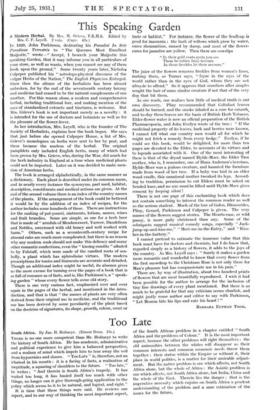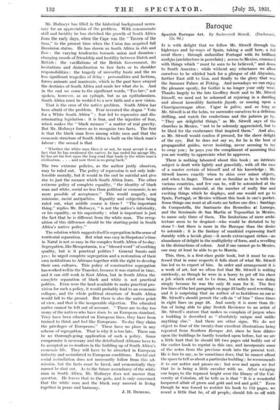Too Late
South Africa. By Jan. H. Hofmeyr. (Ernest Benn. 15s.) THERE is no one more competent than Mr. Hofmeyr to write the history of South Africa. He has academic, administrative and political experience to give him a balanced perspective, and a realism of mind which impels him to tear away the veil from hypocrisies and shams. " Too Late " is, therefore, not an ichabod in his mouth : it is a facing of facts, a realization of ineptitude, a squaring of shoulders to the future. " Too late," he writes ; " And therein is South Africa's tragedy. It has waited too long, it has busied itself too much with other things, no longer can it give thorough-going application to the policy which seems to it to be natural, and logical, and right." It is time that these things were said He reviews one aspect, and to our way of thinking the most important aspect, of the South African problem in a chapter entitled " South Africa and the problems of Colour." It is the most important aspect, because the other problems will right themselves : the old animosities between the whites will disappear as their common interests and common economic needs throw them together : their status within the Empire or without it, their place in world politics, is a matter for their amicable adjust- ment. But the native problem is one which affects, not South Africa alone, but the whole of Africa : the Asiatic problem is one which affects, not South Africa alone, but India, China and the whole of the East. Therein lies the danger : that is the imperative necessity which enjoins on South Africa a prudent understanding of the problem and a sane estimation of the issues for the future.
Mr. Hofmeyr has filled in the historical background neces- sary for an appreciation of the problem. With consummate
skill and lucidity he has sketched the growth of South Africa from the early days, when the Cape was the " Tavern of the Seas," to the present time when the Union has acquired full Dominion status. He has shown us South Africa in ebb and flow : the varying tendencies towards union and disunion : changing moods of friendship and hostility between Dutch and British : the vacillations of the British Government, its hesitations and disinclination to face facts or to shoulder responsibilities : the tragedy of unworthy haste and the no less significant tragedies of delay : personalities and factions, forces animate and inanimate, which in the past have swayed
the destinies of South Africa and made her what she is. And in the end we come to the significant words, "Too late," not spoken, however, as an epitaph, but as an epithalamium. South Africa must be wedded to a new faith and a new vision. That is the crux of the native problem. South Africa has been afraid of the problem. Fear invented the slogan " Vote for a White South Africa " : fear led to repressive and dis- criminating legislation : it is fear, and the injustice of fear, which makes the " black menace " a matter of real gravity. But Mr. Hofmeyr forces us to recognize two facts. The first is that the black man lives among white men and that the economic structure of South Africa is built on the black man's labour : the second is that
" Whether the white man likes it or not, he must accept it as a fact that he has awakened the native, he has ended his savage life, he has set his feet upon the long road that Wads to the white man's civilisation. . . . and now there is no going back."
The two extreme policies, as the author justly observes, may be ruled out. The policy of repression is not only inde- fensible morally, but it would in the end be suicidal and give rise to just the menace which South Africa fears. The other extreme policy of complete equality, " the identity of black man and white, social no less than political or economic, is no more possible of acceptance." This would magnify, not minimize, racial antipathies. Equality and subjection being ruled out, what middle course is there ? "The important thing," replies Mr. Hofmeyr, " is not the native's inferiority, or his equality, or his superiority : what is important is just the fact that he is different from the whiteman. The recog- nition of this difference should be the starting-point in South Africa's native policy."
The solution which suggests itself is segregation in the sense of territorial separation. But what was easy in Shepstone's time in Natal is not so easy in the complex South Africa of to-day.
Segregation, like Mesopotamia, is a " blessed word " of soothing quality, but is it practical politics ? General Smuts said yes : he urged complete segregation and a restoration of their own institutions to Africans together with the right to develop their own cultures. This policy of constructive segregation has worked well in the Transkei, because it was started in time, and it can still work in East Africa, but in South Africa the complete separation of black and white is not practical politics. Even were the land available to make practical pro- vision for such a policy, it would probably lead to an economic collapse, and the whole political structure of South Africa would fall to the ground. But there is also the native point of view, and that is the insuperable objection. The educated native cannot be left out of account. " There are to-day too many of the natives who have risen to an European standard. They have been educated on European lines, they have been trained to think and feel like Europeans. To-day they claim the privileges of Europeans." These have no place in any scheme of segregation. That is why it is too late. There can be no thorough-going application of such a policy. Some compromise is necessary and the detribalized Africans have to be accepted as co-workers in the building up of South Africa's economic life. They will have to be absorbed in European industry and assimilated to European conditions. Racial and social assimilation does not necessarily follow from this ad- mission, but the facts must be faced, and economically they cannot be shut out. As to the future ascendancy of the white Man in South Africa, Mr. Hofmeyr does not answer that question. He leaves that to the gods, and is only concerned
J. H. DETBERG,











































 Previous page
Previous page